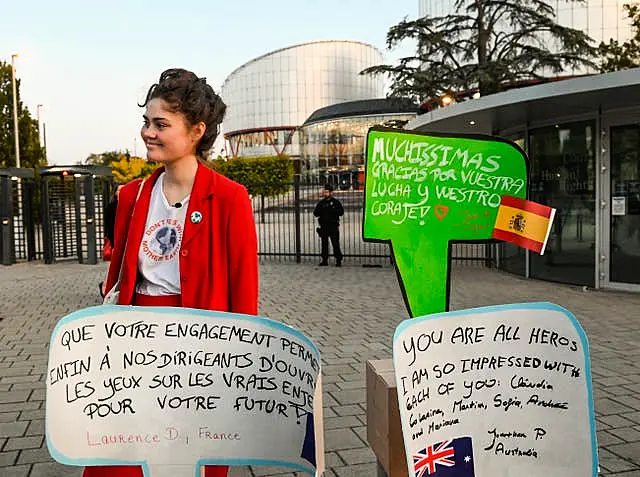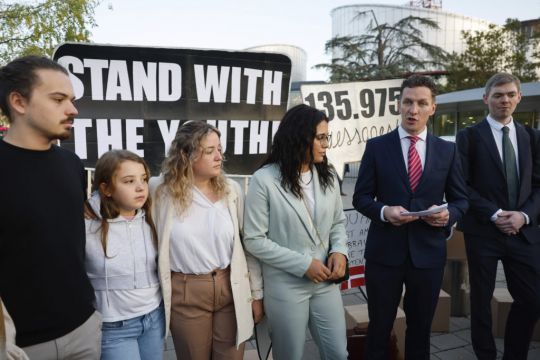Six young people have argued at the European Court of Human Rights that governments across the continent are not doing enough to protect people from climate change.
Legal teams for the 32 nations — which includes the 27 EU member countries, the United Kingdom, Switzerland, Norway, Russia and Turkey — questioned the admissibility of the case as well as the claim that the plaintiffs are victims of climate change harm.
But lawyers representing the young adults and children from Portugal said the nations they are suing have failed to adequately address human-caused warming and therefore violated some of the group’s fundamental rights.

Barrister Sudhanshu Swaroop, a counsel for the UK, said national governments understand the threat of climate change and its challenges and are determined to tackle it through international cooperation.
He said the plaintiffs should have gone through national courts first, and stressed that since they are not nationals of the countries they are attacking, other than Portugal, the European Court of Human Rights cannot have jurisdiction.
“There was no attempt by the applicants to invoke, let alone exhaust domestic remedies,” agreed Isabelle Niedlispacher, a legal expert for Belgium.
Representing the young people, Alison Macdonald told the judges about the urgency to tackle the “biggest crisis that Europe and the world” have perhaps faced, and that governments should play a bigger role in helping control planet-warming emissions.
“It cannot be within a state’s discretion whether or not to act to prevent catastrophic climate destruction,” she said.
Although there have been successful climate cases at national and regional levels — young environmentalists recently won a similar case in Montana, US — the activists’ legal team said that because national jurisdictions did not go far enough to protect their rights, the group felt compelled to take the matter to the Strasbourg-based court.
Arguing that their rights to life, to privacy and family life, and to be free from discrimination are being violated, the plaintiffs hope a favourable ruling will force governments to accelerate their climate efforts.
“We’ve put forward evidence to show that it’s within the power of states to do vastly more to adjust their emissions, and they are choosing not do it,” lawyer Gerry Liston told The Associated Press at the start of the day-long hearing.
The court’s rulings are legally binding on member countries, and failure to comply makes authorities liable for hefty fines decided by the court.
“This judgment would act like a binding treaty imposed by the court on the respondents, requiring them to rapidly accelerate their climate mitigation efforts,” Mr Liston said. “In legal terms, it would be a game-changer.”
Mr Liston said a ruling in favour of the group would also help future climate cases taken at domestic level by providing guidance to national courts.

But the plaintiffs — who are between 11 and 24 years of age and are not seeking financial compensation — will need to convince judges that they have been sufficiently affected to be considered as victims.
The group will also need to prove to the courts that governments have a legal duty to make sure global warming is held to 1.5C since pre-industrial times in line with the goals of the 2015 Paris climate agreement.
“We have put forward evidence before the court that all of the respondents’ state climate policies are aligned to 3C of warming within the lifetime of the applicants, or in the case of some states, worse than that,” Mr Liston said. “No state has put forward evidence to counter that position.”
Science is on the activists’ side.
The world is way off track on limiting warming to 1.5C, scientists say, with global average temperatures projected to rise by 2-4C by 2100 on current trajectories of warming and emissions reductions plans.
As the world warms, climate scientists predict more frequent and more extreme weather events, from heavier flooding and rainfall to prolonged droughts and heatwaves and increasingly intense storms.
The activists said climate change affects their daily lives and their studies, and damages both their physical and psychological well-being. They started judicial action in the wake of a series of deadly wildfires in central Portugal in 2017, where four of them live.
“It’s 43C one day, and the next it’s hail, and that’s dangerous because we can’t predict what’s going to happen,” said 15-year-old Andre Oliveira, adding that the heatwave that hit Portugal in May hindered his schoolwork.







